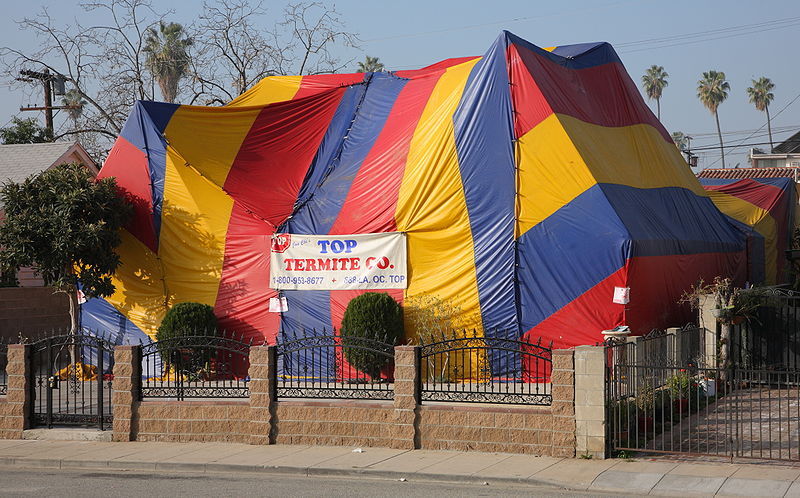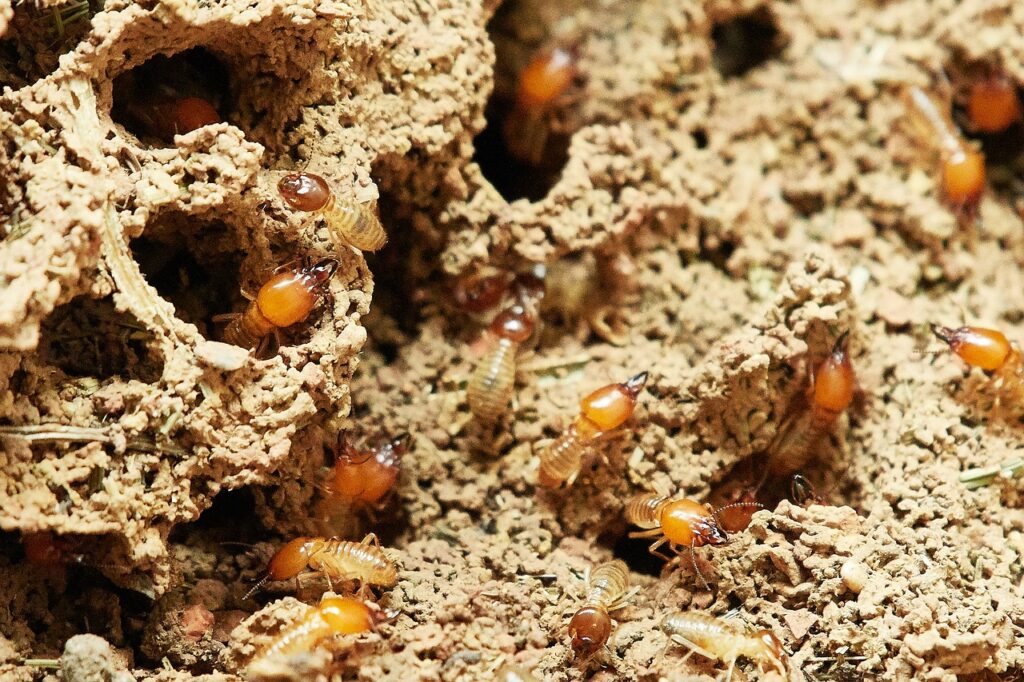You go home from work and you see your neighbor’s home is covered by a huge colorful tent. Well… it’s just about to undergo termite fumigation, a very aggressive but effective way to get rid of termites. But what do you do when your neighbor is fumigating? Should you be concerned?
When a neighbor is fumigating FAQ
Q1: How long will this take?
Your first question will probably be how long you will have to deal with this. Termite fumigation is divided into three parts. Your neighbor will have to do some things before, during, and after the fumigation. But your only concern here is the “during” part.
During a fumigation, your neighbor’s home will be covered by a tent and bombed by a fumigant gas that will kill all termites on the property. The fumigant gas will stay there for about 18-24 hours. And then the pest control professionals will release the gas into the atmosphere.
Q2: Should I be concerned about the chemicals used when my neighbor is fumigating?
The tent is there to trap the fumigant gas inside the property. This is one of the reasons why termite fumigation is so effective. The gas becomes even more potent because it’s circulating in a closed-off space. It will be able to reach even the deepest parts of the property to kill the termites in hiding. No, you should not be concerned about chemicals.
You may also be thinking about the part where pest control professionals release the gas into the atmosphere. You should not be concerned about this as well. Pest control professionals prepare ventilation systems to make the gas escape and dissipate into the atmosphere safely and quickly. You don’t have to worry about leftover residue too.
Q3: Will the termites get into my property when my neighbor is fumigating?
Termite fumigation kills termites effectively. There is no way for termites to get into your property during the process. However, this doesn’t mean your home is completely safe from termites. These common household pests can get to your home, but they are not going to wait for termite fumigation before they get there. If they really want to get to your home, they have done so before even a tent is set up.
Now that you know that your neighbor has termites. It’s a good idea to get a termite inspection to help determine if some of the termites have migrated into your property.

What to do during your neighbor’s fumigation
Action 1: Reach out to your neighbor
Communication is key. If your neighbor’s fumigation is really bothering you, talk to them. Your primary concern should be the pest control professionals who are doing the fumigation.
The ingredients of fumigant gases can be incredibly dangerous. This is why only certified professionals are allowed to handle them. If your neighbor is employing pest control professionals who don’t have the necessary licenses, it may be something of concern. They may be doing unsafe practices that may end up harming you and your neighbor. The tent preventing the fumigant gas from escaping during the fumigation process may even fail.
Action 2: Take it easy
You don’t even have to do anything when your neighbor is fumigating with licensed pest control professionals. You don’t have to worry about the tent failing or the fumigant gas not dissipating into the atmosphere. And here’s the best part — you don’t have to worry about your neighbor’s termites anymore because they will surely disappear after the fumigation. You don’t have to think about termites migrating into your property anymore.
You can move on to your day and mind your own business. In a few hours or days, the tent will be gone.
Action 3: Be vigilant when your neighbor is fumigating
Yes, you can take it easy. But this doesn’t mean you can be completely complacent. There are some cases where fumigant gas ingredients like sulfuryl fluoride have caused problems for the people around them. Exposure to these ingredients can cause difficulty in breathing, coughing, and vomiting. In the worst cases, it can even cause death.
As a precaution, you can close your doors and windows, prevent children and household pets from playing outside, and move potted plants away from your neighbor’s tent. Yes, fumigant gases can damage even plants. Sulfuryl fluoride is more than 4,000 times more potent than carbon dioxide. Exposure can lead to drying or death.

How to avoid getting your neighbour’s termites
Action 1: Have a termite inspection
What do you do when your neighbor is fumigating? Get the contact details of the pest control professionals they have employed, of course. Reach out to these professionals and ask for a quote for a termite inspection.
A termite inspection can be very valuable, especially now that you know that your neighbor has these pests. You don’t know if some of the pests have already migrated to your property, and the best way to know for sure is with the help of pest control professionals.
The professionals can also bomb your home with a pesticide with residual effects and give you some practical tips to prevent termites from thriving.
Action 2: Don’t put termite attractors near your walls
You don’t need to be a pest control professional to know that termites love wood. If there is wood, there is a chance to attract termites. One way for your neighbor’s termites to migrate to your property is for them to be attracted by a wooden object near your wall. Cardboard boxes, firewood, and lumber, especially those that you pile near your wall, are gateways for termites to your property.
Action 3: Minimize moisture around your property
Termites thrive in environments with high moisture. Make sure you don’t accumulate water in your downspouts, drains, and gutters. Fix all plumbing issues that may cause leaks, especially in basements, crawlspaces, and others parts of your home that are near the ground. Don’t forget about air conditioning leaks too.
Some homeowners also use dehumidifiers to help control the humidity of their property.
Try not to worry when your neighbor is fumigating
You don’t have to do anything when your neighbor is fumigating with licensed pest control professionals. The keyword there is licensed. Without the proper licenses, you should be concerned because of the increased risk of pesticide drift. This can harm you, your pets, and your plants.
Talk to your neighbor to know more about the pest control professionals they have employed.

